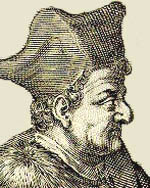Gallery of Philologists
Lorenzo Valla
c1406 - 1 August 1457
Valla's father was a lawyer, and a streak of legal awareness runs through all his major work. He himself studied at Rome and later at Padua. He became a teacher of rhetoric at Padua in 1429 (having been rejected by the Papal diplomatic service in 1428 as too young), but was soon dismissed due to an open letter in which he had ridiculed the scholastic teaching of law. Something more rigorous and also more realistic than the pedagogy of his time was shaping itself in Valla.
He did not at once find a patron. He entered the priesthood in 1431, and again sought a diplomatic position, this time as apostolic secretary in China; again he was rejected. He went to Piacenza, then to Pavia (where he was given a position as professor of rhetoric), and to other university centers. In 1433 he reached Naples, where Alfonse V of Aragon recognized his quality and gave him a place in the world. He made Valla his private secretary in Latin, and subsequently defended him against the many attacks of his enemies, up to and including Pope Eugenio IV.
Valla's dialogue De Voluptate contrasted the Stoics with the Epicureans, and expressed his own sympathy for the recognition of man's natural appetites, a remarkable position for the time. At this moment, the pagan strand of the Renaissance mind found direct expression at the scholarly level. Yet more influential, and its way equally disturbing to contemporary sensibilities, was his treatise De Elegantiis Latinae Linguae, in which he gave a rational account of Latin grammar and expression, and argued for purging contemporary Latin of its adaptive modernisms and returning not only to the style, but to the lexicon, of classical times. This appealed to enough scholars that it presently carried the day, but it ultimately spelled the doom of the easy workaday Latin, the unifying vernacular of that same scholarly world, and doubtless accelerated its replacement by European local languages, a process which has become complete in our own time.
In the minds of many, Valla's great moment came in 1439, with his demonstration that the supposed Donation of Constantine as a forgery. His patron Alfonse V had been involved in land disputes with the Papal States, and the ultimate basis for the Papal claim was the Donation. This purported to be a specific grant of land rights and of ecclesiastical authority to the Roman Pope Sylvester (r 314-335) by the Roman Emperor Constantine I ("the Great"). There had been earlier suspicions about this document (among them those of Nicolas of Cusa), but none of them had been decisive for scholarly opinion in general. Valla's essay De Falso Credita ed Ementita Constantini Donatione Declamatio was published in 1440, and quickly established the inauthenticity of the Donation. He found that though the document does use some terms going back to the Roman Empire, particularly in its framing first and last sections, its language as a whole shows late features which could not possibly have been used by a writer of that time. The legend of Pope Sylvester's cure of Emperor Constantine also appears in a late, not an early, version. Some sources of the Donation can be identified; they include letters of the 8th century Popes. The Donation was not cited by any Roman Pope until the year 1054, by Leo IX, and the likeliest theory is that it was written in or after 800, the year of the coronation of Charlemagne, in order to give him effective title to the huge territories which it mentions.
Not all Valla's lines of argument, in his 1440 treatise, are cogent in the eyes of modern scholars (more evidence has become available since he wrote). But the part that remains is still regarded as decisive. This was one of philology's high-profile triumphs, and was achieved in a major matter: the land rights to much of Italy. Slaying such a dragon fairly entitles the doer to remembrance in the pantheon of the art.
In subsequent years Valla exposed other forgeries and misconceptions, and continued in various ways to oppose the temporal power of Rome and the Church establishment of his time. He showed that the supposed letter of Christ to Abgarus (although Eusebius had quoted from the copy in the Armenian state archives) was a forgery. He cast doubt on the validity of monastic life as such. He survived an appearance before an inquisitory tribunal at Rome only by the intervention of Alfonse. Having survived, he continued to write in the same vein, ridiculing the Latin of the Vulgate Bible, the universal scripture of Western Christendom, and accusing Saint Augustine of heresy. In 1444 he visited Rome, but soon fled in disguise to Barcelona, making his way eventually back to Naples. His political fortunes turned for the better with the death of Eugenio IV in February 1447. Valla was welcomed to Rome by the new Pope, the bookish Niccolo V, founder of the Vatican Library, who made Valla an apostolic secretary. This acceptance at the center has been called "the triumph of humanism over orthodoxy and tradition." Following Niccolo V's death in 1455, Valla continued to enjoy the favor of the next Pope, Calixtus III, though not for long: Valla himself died in 1457.
Valla's achievement in clarifying Latin grammar and purifying Latin style was conspicuously praised by Erasmus, and his championing of wider human horizons made him in the eyes of many a precursor of Luther. He is the kind of pugnacious but right-minded personality around whom the affections of a safely distant posterity gladly unite. Grafton finds that it was rather Poliziano, in the next generation, who is properly identified as the ancestral figure for later European philology. This dispute need not be pushed to the point of decision. Philology has room for all its ancestors, and room and a half for all its practitioners.
2 Oct 2006 / Contact The Project / Exit to Gallery Index Page

